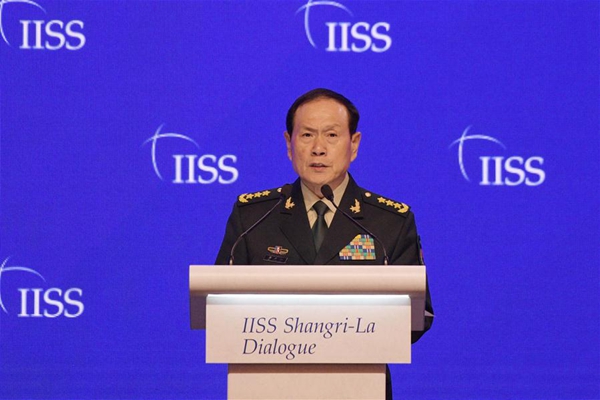China's wisdom on security cooperation contributes to regional peace, stability
 0 Comment(s)
0 Comment(s) Print
Print E-mail Xinhua, June 3, 2019
E-mail Xinhua, June 3, 2019

"While striving for common prosperity in the Asia-Pacific, we must respect the core interests and accommodate the security concerns of all," said Chinese State Councilor and Defense Minister Wei Fenghe during his speech at the 18th Shangri-La Dialogue on Sunday.
"We in China do not covet the interests, nor envy the development, of others. However, we shall never give up our legitimate rights and interests," Wei added. "No country should ever expect China to allow its sovereignty, security and development interests to be infringed upon."
This was the first time for a Chinese defense minister to attend the Shangri-La Dialogue after eight years. Wei's honesty, frankness and not shying away from harsh questions gave delegates a good impression, said Li Mingjiang, an associate professor at Nanyang Technological University in Singapore.
Cooperation benefits China, U.S.
This year marks the 40th anniversary of the establishment of diplomatic ties between China and the United States, and the bilateral relationship has been steadily growing in the past 40 years, despite all the ups and downs, Wei said.
"The most valuable lesson we have learned from the four-decade-long relationship is that cooperation benefits the two sides while confrontation hurts both," the defense minister said.
Wei's speech mentioned the essential part of China's policy on the United States, that is "fighting but not breaking," said Li. "We've seen the fighting, but Wei also emphasized cooperation, which is very important to all, so that regional countries don't have to choose sides."
During his speech, Wei noted that the two militaries have agreed on building their relationship into a stabilizer for the overall relations, maintaining regular communication on the strategic level, and managing risks and preventing conflicts.
"The two sides recognize that military conflicts or even a war between them would bring disasters to both countries and the world," he said. "It takes two to cooperate, but only one to start a fight."
Wei's speech echoed U.S. Acting Secretary of Defense Patrick Shanahan's remarks a day ealier on building a bilateral military relationship as a stabilizer for the overall relations, said Francois Heisbourg, a senior adviser for Europe of the London-based International Institute for Strategic Studies (IISS).
"So I think maybe the two militaries have some scope for a degree of maintaining normality in relations. But that will depend on the political development," he added.
All participating defense ministers and other delegates to the dialogue were glad to hear from Wei that the Chinese military will interact more with the U.S. military and develop a better relationship, said Singaporean Defense Minister Ng Eng Hen.
"This is good news for all of us," Ng said. "From the Singaporean perspective, both sides strengthening interaction will help lower risks and reduce misjudgement for either party."
Asia-Pacific security
At the event this year, over 600 defense ministers, policymakers and experts from about 40 countries gathered from Friday to Sunday to discuss security issues in the Asia-Pacific.
"We should respect and accommodate the legitimate security concerns of one another," Wei said. "China understands and respects the sovereignty, independence and territorial integrity of all countries, and supports the social systems and development paths they independently choose."
"The minister has systematically elaborated China's concept on international security order, world peace and stability, regional security and safety, and explained some of China's specific actions, these have yielded positive results," said Li.
For one, Wei refuted the allegation that China is militarizing the South China Sea islands and reefs.
"It is the legitimate rights of a sovereign state to carry out construction on its own territory. China built limited defense facilities on the islands and reefs for self-defense," he said. "Where there are threats, there are defenses."
The current situation in the South China Sea is improving towards greater stability, Wei said. Over 100,000 ships sail through the South China Sea each year and "none has been threatened."






Go to Forum >>0 Comment(s)